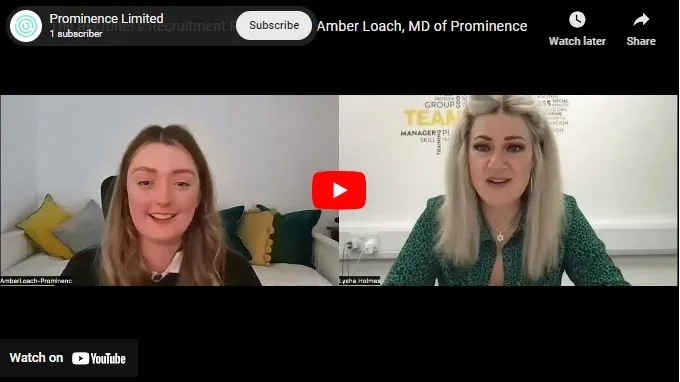Marketing News

To stand out from the competition, effective marketing is more important than ever for recruitment agencies. Without it, your business growth can quickly hit a brick wall and force your consultants to fish in the same pool of prospects. That’s hardly enjoyable or productive (even if your consultants won’t admit to it!) In a highly competitive market, the good news is that you can optimise your costs with outsourced recruitment marketing and access capabilities that can take years to build in-house. We’ll explain why and how. The Real Costs of In-House Marketing The average marketing budget sits somewhere between 7-10% of company revenue, as surveys by Deloitte and Gartner suggest. (If you’re in start-up or high growth mode, that percentage will be higher.) Plans to increase marketing budgets over the coming years will, of course, vary by industry and business needs, but it’s clear that internal marketing teams don’t come cheap. For businesses based in the UK, the average marketing coordinator salary is in the vicinity of £24,000. With the recent increase in the employer National Insurance Contributions rate (from 13.8% to 15%), recruitment agencies are now facing significant payroll costs – and that’s before any marketing is being done to speak of! Breaking it down, an in-house marketing coordinator on a minimum salary of £22k will cost an additional £770 annually from 2025, whilst a midweight marketer on £45k will cost at least another £1,000. Add that up over a team of two to four people (or more), along with leave entitlements and other employee costs, and those pounds sure add up. Not to mention the cost of replacing and onboarding marketing employees. Recruitment agencies in Australia don’t get off lightly, either. To employ a full-time marketing coordinator, you’re looking at an average salary range of $70,000-$80,000 AUD. Add in superannuation, payroll tax, minimum leave entitlements, along with onboarding and training, the actual annual cost of that coordinator will be 1.25 to 1.4 times higher than their base salary. That’s up to $122,000 annually for one employee with a limited skillset. Here’s the catch: a junior or midweight marketing coordinator can handle the basics, but when your business needs specialised marketing skills to grow, you’ll need to hire more specialists – and that’s when your costs will skyrocket. Access to Marketing Expertise Without Hiring With outsourced marketing, you can skip the fixed, ongoing expenses of an in-house marketing team. Outsourcing gives you access to specialised skills like graphic design, paid advertising and copywriting when you need them, without the ongoing overhead of salaries and taxes. After all, your business might not need the same set of marketing skills all year. Certain expertise is more important for some campaigns and marketing plans and not others. When using an outsourced marketing agency like us, you get access to an embedded marketing team where you only pay for work you need during a given project or timeframe. We act as an extension of your business to manage your marketing, giving you a range of established skills and strategic knowledge at your fingertips. All without making a single hire. Scalability Based on Business Needs An outsourced marketing solution gives you precious scalability. As all recruitment business leaders are aware, business conditions fluctuate. Your goals will inevitably be adjusted to meet changing market conditions. Based on our experience in working with recruiters, here are common scenarios where marketing scalability is a survival issue: 1. Crowded Markets In crowded industries and sectors, recruiters face stiff competition from rivals with big marketing budgets. To stay ahead, they need smart and adaptable strategies that pack a punch without overspending. 2. Start-Up Challenges For new recruiters with limited revenue and an unproven offering, the focus is on generating interest and building momentum quickly. Outsourced marketing will provide that essential lift-off without the risk of hiring an untested marketing coordinator. 3. New Ventures and Expansions Recruitment agencies launching a new service or breaking into a new market will need a surge in marketing resources to ensure their efforts pay off. Scalable marketing means recruiters can dial their efforts up or down as needed. No overcommitting, nor missing out on opportunities! How do you achieve this sweet scalability? With an outsourced marketing solution, one that gives you flexible pricing options and a solid range of capabilities. If you want to pay on a project basis or have a marketing team on retainer, a good marketing agency will give you those options, too. This helps you forecast and manage costs over any length of time. Reduced Hidden Overheads On top of staffing costs, there are a few other cost gremlins lurking under the floorboards that most companies aren’t aware of until it’s too late. Infrastructure expenses like marketing software and tools quickly add up, especially when you need a group subscription or must pay a premium for basic functionality. An outsourced marketing provider has all these necessary tools, so you don’t need to duplicate them. Even the office space you need for an in-house team can sometimes get overlooked – an often astronomical cost that is becoming harder to justify for many businesses! Engaging a marketing agency gives you access to a marketing team at your fingertips, without the expense of bums on seats. The Final Word Of course, there are many situations where it makes good business sense to maintain or grow an in-house marketing team. The key, however, is to understand the big picture: your balance sheet, the ROI you can reasonably expect from an in-house team, and which options will best enable you to stay agile in a challenging market or business phase. Understanding these factors will guide you to the right marketing solution and avoid expensive mistakes. Outsourced Marketing for Recruiters, Done Your Way We’ve sung the praises of outsourced marketing here, but we’re also experts at helping our clients get the best out of their internal marketing teams. Whether you’re seeking marketing specialists that can dovetail with your internal team, or a standalone solution, or something else, we can do it for you. Let’s talk! Get in touch with Prominence today – we’d love to hear from you.

We can’t think of a single instance of a recruiter saying they love admin. And yet, administrative tasks eat up increasingly large chunks of a recruiter’s workday. It’s a given that job application volumes will keep rising, leaving recruiters with shrinking resources to carry out other vital functions – like nurturing passive candidates, engaging clients, or building a social media following. Marketing automation can solve many of the resource problems recruiters face. Trying to juggle activities like generating leads for new clients and candidates alongside the day-to-day practicalities of sourcing, interviewing and client consultation gets painful fast – unless you have the right tools to automate the process. We’ll explain how marketing automation for recruiters works in the wild, and how you can use it to connect with your target audiences. How Marketing Automation Helps You Target Clients Marketing automation for recruiters can be applied to every stage of the sales funnel, from raising awareness of your brand to building relationships with your long-term clients. Its potential for generation BD leads is second to none. Generating leads is one of the most effective uses of marketing automation and is generally an ‘always on’ feature, as long as you’re in business! Email Marketing

In an era where it feels like everyone, including the neighbour’s dog, has a podcast, it’s tempting to dismiss the idea as just another marketing trend. That, however, would overlook the immense potential podcasts hold for BD in recruitment. We love podcasts for their versatility, their ability to be consumed anywhere and as a vehicle for demonstrating your subject matter and industry expertise. As a recruitment marketing tool, podcasts aren’t just about the number of listeners per episode, the size of your subscriber base or the number of clicks. Podcast marketing gives recruiters that essential foot in the door in BD campaigns and gain plenty of other hot leads besides. We’ll explain how. Give Recruiters a Reason to Pick up the Phone Think about the typical recruiter approach to a business development call. It often starts with something along the lines of, “Do you have any vacancies you need filling?” Now, while that question might get straight to the point, it’s hardly the kind of opener that’s going to blow their socks off. But imagine flipping the script entirely. Instead of the usual pitch, what if you reached out to a potential client with a question like this: “We host a podcast focused on the (insert your recruitment specialisation here) industry, and we’d love to have you as a guest to discuss the challenges in developing the future workforce.” Suddenly, you’re looking at buy-in. What would usually be a cold call can quickly become a warm one – and make for a faster connection with your prospect. You’re not just another recruiter trying to win placements, you’re a thought leader offering them a platform to share their insights – a flattering proposition! This approach is far more engaging and offers potential clients something of real value. They get an opportunity to raise their brand awareness among candidates and demonstrate their expertise. Before trying this approach, you will of course do solid research on your prospect and be ready to explain why they would make a good guest on your podcast. Spice Up Your Lead Generation With well-crafted podcast content, you’re creating a goldmine of recruitment marketing material that can be repurposed across multiple channels, expanding your lead generation potential. Key moments from a compelling podcast episode can be turned into snippets and used virtually anywhere. Highlighting a thought-provoking quote, a surprising statistic, or a powerful insight is perfect for bite-sized content. By transcribing your episodes, you can easily identify these highlights and transform them into punchy graphics with quotes, video clips, or text posts to drive engagement on social channels – and attract more clicks to your website. Podcast episode highlights are also excellent material for your blog posts, newsletters, and email marketing. When launching an email campaign centred around a specific theme, you could highlight snippets from a podcast where the same issue is discussed. Used in this way, podcasts can really add depth to your messaging and reinforce your authority as a subject matter expert. Direct Listeners to Purpose-Built Resources Landing pages pair with podcast marketing like wine does with cheese. Throughout your podcast episodes, make it a habit to guide listeners to a dedicated landing page where they can access free and valuable guides. Think salary reports, whitepapers, how-to guides for hiring managers or candidates – the sky’s the limit! These resources are just a quick form away – listeners simply enter their name and email address to download the content. This simple step turns casual listeners into potential leads. Once they’re on your list, you can nurture these connections through targeted email marketing, using newsletters to engage and convert them. Use Follow-Ups and Collect Feedback Following up podcast episodes with surveys is another way to produce solid leads. After each episode, you could send out a brief survey that includes a question like “Are you planning to hire in the next three months?”. Those clicks are currency! (Even if they’re not hiring immediately, you’ve planted a seed.) Invite listeners to complete polls and give feedback on each episode – e.g. “Who should we bring on as a guest next?” This can also draw in guests who become your clients. Tools to Get Started with Podcast Marketing The cost of producing a podcast will vary, but there is no need for overkill, especially for your first few episodes. When you’re just starting out, aim for clean audio and tight editing without extra frills. Investing in a couple of professional-quality microphones is easier than ever – your typical tech retailer will have a range of affordable options to choose from. Make sure you buy two, so you can record your host and guest properly! There are plenty of affordable editing software tools out there for turning out polished recordings. If you’re willing to engage a freelance editor , you can save time and get a truly professional-sounding result. Finally, you’ll need a reliable hosting platform that gives your listeners easy access through a range of devices. Get Tailored Advice on Creating Your Podcast Podcasts for recruiters are an excellent channel for demonstrating all that valuable expertise you’ve built up over years in the industry, whilst developing a connection with your audience – and warm leads! At Prominence, we’ve helped dozens of clients successfully launch podcasts that have helped them smash their marketing goals. Contact us today to get help with developing your podcast marketing strategy.

You might call us biased, but we think marketing should be on the top of the list when slicing up the pie each financial year. Far more than the team who “make things pretty”, strategic marketing professionals can help increase a recruitment agency’s brand awareness, drive customers to your services, and ultimately increase your bottom line.
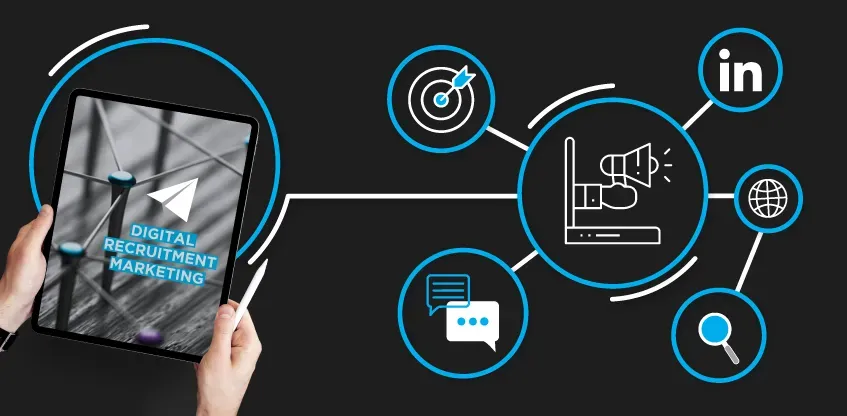
Wow, where do we start with an article titled “what is digital recruitment marketing”?! Firstly, it is important to debunk some of the myths that exist around digital versus regular recruitment marketing: 1. Contrary to popular belief, offline (job ads, events, etc) and online marketing both still have a place in a recruiter’s marketing toolkit. However, over the last 10 years or so, digital has definitely become the shiny new toy. 2. Digital is not one single thing. This means that whilst automation can be considered digital, so can things such as inbound marketing, social media marketing, email marketing and, of course, paid online advertising. So, What is Digital Recruitment Marketing? In its simplest form, digital recruitment marketing is the use of digital channels to reach either candidates, clients, or potentially recruiters themselves, to get them to engage with a recruitment brand, with the end goal of generating more placements. Digital channels utilised for recruitment marketing include:
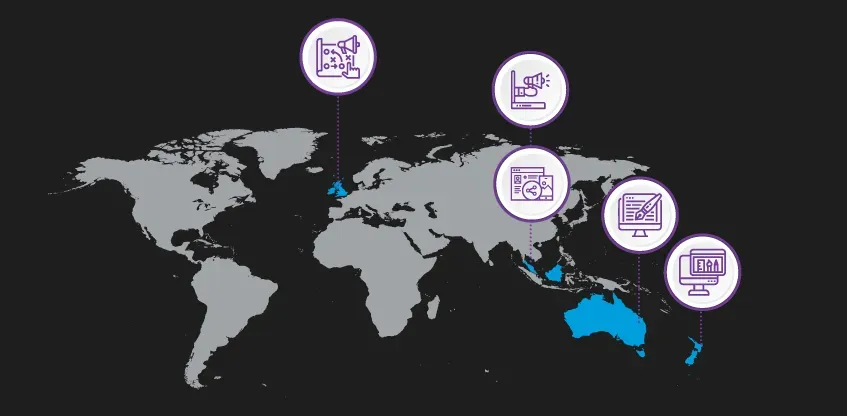
We’ve known for years that Prominence is a perfect fit for the UK recruitment market – we’ve just been waiting for the right time. But one thing a global pandemic has taught me is that sometimes you just have to hit go and see what happens, which is exactly the conversation Chris and I had a couple of months ago, so here we are! I never in a million years thought that I would base my career in the world of recruitment! However, I’ve been working in recruitment marketing for over six years. Starting out as an internal marketer in both London and Sydney, to where I found my feet at Prominence, as Marketing Account Manager, and then Marketing Strategy Manager. As cliché as it sounds, I’ve loved being a part of the Prominence journey from a start-up (the business was just 6 people when I joined) to a global agency, with four offices in Australia, New Zealand, Malaysia and the UK. And each office chocker block with talented marketers! From senior strategy managers and social media managers to graphic designers, animators, paid advertising specialists, and exceptional copywriters. Working with recruiters across Australia, being able to offer advice and direction that has genuinely contributed to the success of their business has been incredible. So much so, that I really struggled handing over my clients when I left Australia earlier this year! I’m looking forward to having that kind of relationship with agencies on this side of the world too.
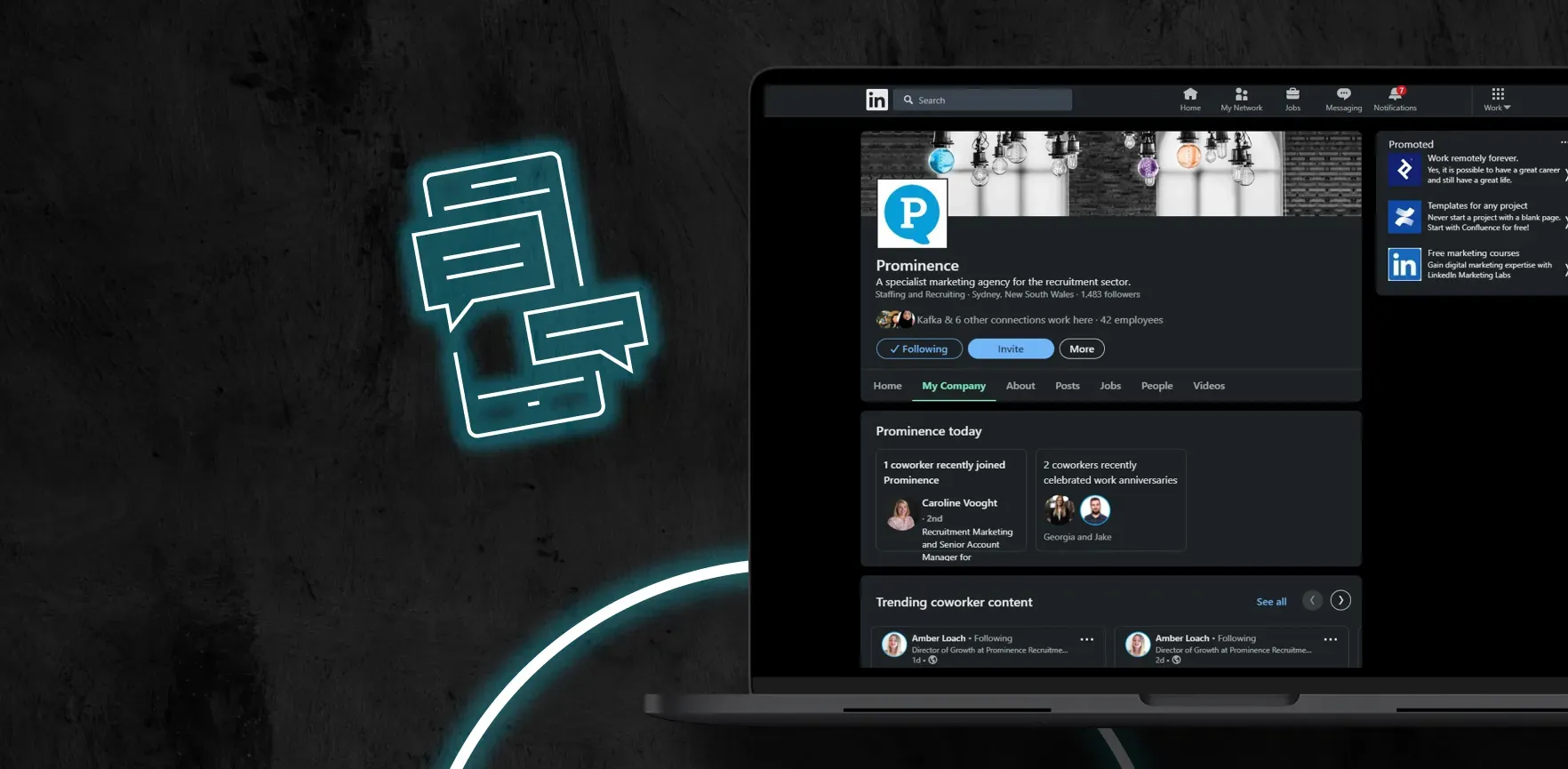
Scrolling through your LinkedIn feed can sometimes feel worthy of a game of bingo. How many times do we see #humblebrag posts with the sole purpose of self-promotion? We’re not saying that’s entirely a bad thing, but if you want your post to stand out from the crowd and effectively communicate your message to your reader, you’ll need to be a bit more strategic! Here’s our top tips for creating LinkedIn posts that will get your business noticed. Use Attention-Grabbing Visuals We’ve all experienced the sore-thumb syndrome that comes from scrolling through social media feeds too much. But the reality is that we are all fickle creatures and value our precious spare time. If you’re on a break between meetings or sitting in the back of a taxi home, what’s going to get your attention? Not a big block of text, that’s for sure! LinkedIn’s own research shows that posts with images have a two times higher comment rate, and larger images have a 38% higher click-through rate than other images (LinkedIn recommends 1200 x 627 pixels for single images). If you have the means to produce video content, you can upload up to 15 minutes of footage (10 from your phone) to LinkedIn’s native video platform. You’ll be able to share your story in a more captivating way and build trust with your readers by ‘showing, not telling’. Ask For Opinions It suffices to say that a lot of people like the sound of their own voice, especially online. Were you ever told in your more junior days that the best way to build a new relationship is to ask for advice? Not only do you make the person you’re asking feel important, but you also have the opportunity to start a discussion. Social media is no different, and putting out questions or polls can be a great way to engage people. Don’t worry, if you’re strategic about the question you post you won’t look uninformed. In fact, the question itself can be an opportunity to demonstrate your knowledge and understanding of the industry. Think about topics trending in your market at the moment. It could be anything from world news (e.g. the impact of the upcoming recession or the increase in energy prices) to niche announcements about businesses changing their HR policies or letting people go. By kicking off the conversation, there are endless opportunities to engage with readers and build rapport. Host an Interactive Discussion Taking things one step further, you could also host a native video livestream from your company page. It may sound daunting, but evidence shows LinkedIn Live video generates 24 times more engagement than the average post. Content-wise, there are lots of options, from livestreaming a webinar or panel discussion, to keynote speeches at conferences. And you can book the streams well in advance so you can also get some mileage out of promoting the event and building your ideal audience. Drive Traffic to Your Website It’s been reported that the average user spends just seven minutes and 30 seconds on LinkedIn every day. One way to get around this is to be a ‘save for later’ article that drives the reader back to your website where it’s being hosted. This is beneficial for many reasons – it gives the reader a greater understanding of your brand and also offers the chance to browse around your site. They’re already there, so why not take a look around? It also breaks you away from the LinkedIn feed and prevents you getting lost amongst the ‘I must read that one day’ pile. Don’t Forget Your Employees Another interesting stat for you – 30% of a company’s engagement on LinkedIn comes from employees. They are also 14 times more likely to share your company content when compared with other types of content. Think about each of your employees as being an online brand ambassador with the capacity to amplify your messaging across their networks. Not only will it boost your brand recognition, but it says a lot about your team culture and values when you have employees wanting to see you succeed. There are many ways you can maximise opportunities with employees, such as: Creating a branded cover image for them to add to their personal profiles Creating a hashtag for your business and encourage your team to add it to their posts Sharing your employee’s LinkedIn posts on your company page Summary LinkedIn remains the number one professional networking site in the world, and is constantly developing new and innovative tools to help people and businesses connect. This list is just a taster of what can be produced off the back of a strategic, measurable social media plan for your organisation. Here at Prominence, we are specialists in recruitment marketing and work in partnership with our clients to build brand recognition, drive engagement, and boost revenue. We understand the challenges of operating at the frontline of talent shortages, changing attitudes to work, and tightening profit margins. If you’d like advice on the best way to build your network and attract new clients to your business, get in touch with us today.

When we are speaking to a potential new recruitment customer, one of the questions that we are regularly asked is how as a recruitment industry specialist marketing agency we ensure that we avoid conflicts of interest when representing different recruitment agencies. In summary, we carefully manage our client relationships so that conflicts are avoided and approach any concerns raised with complete transparency. There is obviously a lot more to it than that, so below is the detailed answer: Visibility is Everything In the world of marketing, nearly everything that is undertaken will at some stage be publicly visible. In fact, often the more visible something is, the better! The key is to ensure that while the activity is being planned it is kept under wraps so that a competitor can’t beat you to the punchline. Once a particular strategy is live, the chances of it being copied are high, as other firms will inevitably try to go with options that are proven, easy wins. As an example, we believe we were the first company to really get social job marketing cards right. Simple, branded, customisable images which recruiters could use on social media to promote their hot jobs. We’ve been doing this for over three years and nowadays most recruitment firms have their own version. The key with marketing is to continue to innovate. In the recruitment sector, the pace of change is slower, but this point is still important, especially in today’s digitally driven environment. However, as a marketing partner, if we were to utilise a client’s unique idea for another agency, this would be a clear breach of trust. We would expect to go out of business pretty quickly if that was how we operated! One of the benefits of working with us is that those barriers exist. If you have an internal marketer who leaves for the competition, or another firm simply copies your ideas, there are no barriers at all. That said, there are elements to marketing that are commonplace and can’t be ‘owned’ by any particular firm. Salary Surveys are a great example. How many recruitment agencies produce salary surveys? It’s a lot, many of whom are in direct competition. There is nothing new about them (although our product is pretty cool!), so multiple clients producing these rarely presents an issue. We’re Your Partners s a marketing partner, we ensure we are heavily exposed to and involved in your recruitment agency’s marketing strategy. However, we avoid exposure to your day-to-day business strategy unless it’s absolutely necessary. For us, this allows us to get on with our part of the job to the best of our ability, but this unique way of partnering also means that we avoid other conflicts that could otherwise present themselves; such as the movement of staff between agency or competing for similar business. Furthermore, everything we do for our clients is brand personalised and specifically tailored to that agency. This is the true value of content marketing. We may write 10 different blogs on CV tips (sometimes even for the same client!) but each will have a unique angle, reflecting the different opinions and outlooks of every recruiter we speak to. We do this by having a dedicated team that pays close attention to what makes each recruiter, and each agency different, and reflects that in the work that is produced for them. Internally we have grown to be such a size where we have numerous strategists, writers and designers, ensuring that content produced for one client will not be similar to that of another. We also operate very stringent Chinese walls, whereby the work of each client is kept isolated from one another. In Closing Like all business partnerships, there are always conflicts that will arise. It’s unavoidable, to some degree. It’s our belief that when these conflicts happen, it is how these are addressed and managed that makes a great partnership. As mentioned, we know this is a sensitive issue for our current and prospective clients, so we approach it with care, sincerity and complete transparency. If you’d like to speak to a marketing partner whose ethos is based around co-operating effectively to deliver excellent results, then we’d love to speak with you.

Over the last month, chances are you have been prompted at least once to review a restaurant, hotel or any one of hundreds of other products or services. The difference, compared with only a few years ago is the broad variety of websites that now request reviews. Some are very specific to the industry that they service, for example, Zomato for restaurants, whereas others are relevant to almost every business, for example, Google Reviews. You may not have even noticed that reviews are becoming commonplace in the recruitment sector. Again, only a few years ago the only major review site relevant to our industry was Glassdoor, albeit that Glassdoor hasn’t experienced much momentum in Asia-Pacific yet. As of today, the review sites that currently exist and are relevant to recruitment agencies in APAC include Glassdoor, Indeed, Seek, Google, Facebook and LinkedIn. With all of these channels, ever increasing prompts to leave reviews and consumers who are more readily used to reviewing everyday elements of their life, the chance of you or your recruitment business either wittingly or unwittingly receiving reviews is considerably higher than ever before. As online reviews continue to become more commonplace the reviews that your business has will, without doubt, start to impact your ability to attract top talent and also win new business. Just imagine the day you receive a response to a well thought through RFP stating that the business isn’t proceeding with your agency because of numerous poor online reviews. Obviously, this is an extreme example, but at the other end of the spectrum are really high-quality candidates who elect to work with another Recruiter because they have better or more credible personal LinkedIn reviews (in this case recommendations). Good News The good news is that it is relatively easy to position your business in a positive light if you choose to proactively take control of your agency’s brand across core websites or apps. This is because the vast majority of our industry isn’t keeping up to speed with this fast-changing consumer behaviour. With the exception of LinkedIn, on every other review site, it is nearly impossible to remove or edit unwanted feedback. This means that if left unchecked the probability of your agency’s reviews being negative is high. Even if as a business you pride yourself on excellent service there are bound to be the odd anomalies. This is because people leaving reviews are significantly more likely to have had a negative experience than neutral or positive. The only way to counter this is to actively seek positive reviews on your target channels. As an individual Recruiter, the simplest way to do this is to always be looking to transfer any positive feedback from candidates or clients into online reviews. Expanding on an earlier point, this generally means encouraging recommendations on the main professional networking channel LinkedIn. As an individual Recruiter, it is absolutely critical to have up-to-date recommendations from relatable candidates and clients. As a Recruitment Manager or Director obtaining positive reviews is a little trickier and involves greater amounts of up-front planning. In our experience, working with many agencies, we have found the best way to do this is to combine review requests with more commonplace satisfaction surveys. Typically, most agencies these days send out automated or semi-automated requests for feedback to clients and candidates that they have either placed or possibly have just organised interviews for or with. These feedback requests are normally through tools such as Survey Monkey and encompass NPS (Net Promoter Score) questions. The Resulting NPS score and other feedback provide a really good indication of how satisfied with your service that particular customer is. It is then only a small logical leap to send those who have left positive feedback a message requesting them to post this on your chosen review channel. In some businesses, it may also be suitable to incentivise the customer to do this, for example offering a voucher or similar. What is critical is to ensure as much of this process is automated, to maintain a good, consistent experience. There are other methods to encourage positive feedback, for example, you could ask candidates during your initial interviews to consider leaving feedback at a later stage. Whilst you’re building your businesses’ positive reviews and even once you have them flowing, it is really important to also engage with everyone that takes the time to review your business. This is especially true if you’re unfortunate enough to receive negative reviews. The key here is to show you’re listening, that the issue is being investigated appropriately and to avoid long winded back and forth arguments. Summary Hopefully, this article encourages you to at least review the existing online feedback that exists on either yourself or your business. If you are looking at implementing a positive review system please feel free to get in touch.
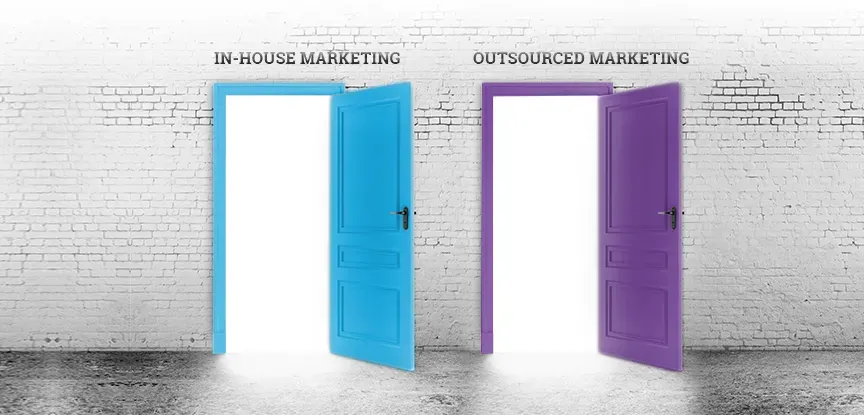
Not surprisingly, when we speak with prospective clients, one of the first questions we get asked is: “Can you tell me the differences between hiring an in-house marketer and outsourcing to an agency?” We’re obviously biased, but the reality is that there isn’t a simple answer to this question, as a lot depends on the specific situation of your recruitment business. So, with this in mind, what we’ve tried to do here is to provide an overview of what you can expect with the two different approaches to recruitment agency marketing. The main two elements you should consider when evaluating your marketing options are costs and objectives. For example, if your budget is less than $40,000 per annum, then your choice is limited to either working with an agency or hiring someone to work part time. In the same way, if your objective is to grow quickly and outpace your competition, then your budget and approach will obviously need to reflect this. In-House Marketing Firstly, let’s explore the different types of in-house marketer that are typical in recruitment firms. The commonly agreed ideal in-house scenario is to have a senior marketer tasked with overseeing strategy and campaigns, supported by one or more juniors who can carry out day-to-day delivery, such as content writing, graphic design and social media management. Most mid-sized agencies (in this case I’m referring to any recruitment business of up to around 100 recruiters) aren’t fortunate enough to have a budget big enough to warrant this ideal scenario, so instead opt for one of three solutions: hire a senior marketing professional, hire a marketing graduate or transfer someone internally into the role (usually a recruiter or admin). Each of these solutions is going to bring different assets to your business. Obviously, a senior marketer will know how to put together a strategy, although it would be ideal if they will have already worked in the recruitment sector as there are very few other industries that have two or even three very different audiences (candidate, clients and sometimes recruiters). The other two solutions won’t be much help with strategy, but internal moves are likely to have the best understanding of the recruitment sector and your company’s brand, whilst marketing graduates, especially those with a year or two of experience will likely be the most competent across all the tools needed for delivery. Whichever option you select, if they are going to be the sole marketer in your business, it’s vital to ensure they are a true generalist rather than a specialist in a specific subject area. To deliver on a good strategy they will need the following skills, listed in order of importance: Basic Marketing Principles, Content Writing, Graphic Design (this really has to be Adobe Photoshop, Illustrator and InDesign), Google Analytics, MailChimp (or other EDM tools), Social Media (LinkedIn Advertising, Facebook Business Manager, YouTube), Google AdWords. Other desirable skills include: Basic HTML/Wordpress knowledge, SEO, and Video Editing (Premier Pro). In addition, probably the most important skill your marketer needs to have is the ability to influence, hold their own and drive action. I don’t think I’m speaking out of turn when I say recruiters are a unique group of people. We are always flat out juggling lots of jobs, candidates and clients, and rarely have time for anything else. In order for recruitment marketing to really succeed, your marketer has to be able to get these people to give them some of their time, make decisions and ideally contribute towards the activity. When hiring your marketer, also evaluate their long-term plans. It is vitally important that your marketer remains with the business for at least the first two years. This is because it will take three to six months to get up to speed and if they leave within the two-year window, you’ll find yourself back at the beginning. A junior will likely remain challenged during this time but a senior may outgrow the company and role. Lastly, no matter what marketing mix you decide upon (even sizable marketing teams) it’s likely you will still need some external support; most commonly online advertising and retargeting are outsourced, but also graphics, video, writing, or whatever other skills the team either doesn’t have or doesn’t have time to do. Outsourced Marketing Let’s start off with what outsourced marketing is. Most marketing agencies are geared around campaigns and paid a small retainer to be available as and when the need for these arise. Each campaign is then priced based on the work required. The evolving digital landscape has meant that for the last ten years there has been a new model that caters to the constant on-going marketing efforts, termed Outsourced Marketing. If you expected me to say this solution is perfect for every business, you’d be wrong. It isn’t. For starters, we know that the outsourced model only works for businesses that have more than five full-time recruiters (unless you’re in high-growth mode), we also know that for some, having a person in-house that can be summoned at a moment’s notice is a deal-breaker. The key to successful outsourcing is to work with a partner agency that has an in-depth understanding of the local recruitment market. If you have this in place, there aren’t a lot of differences between having an in-house marketing team. The agency will have one or more people who will assist and direct strategy, then specialists that take care of each component of your delivery, from social media through to graphics and content writing. With specialists in each department, you can expect that the time taken to complete various marketing tasks to be faster than a generalist marketer who is trying to cover multiple bases. You’ll also get access to all of the agency’s industry knowledge and insights, avoiding wasted time and effort on campaigns that underperform. Communication is the critical success factor. Where possible it’s important to treat the agency team as an extension of your team. As an example, putting them in direct contact with your recruiters to ghost-write articles on their behalf, or having them present marketing updates to your management team or board of directors. Costs There are two costs that should be considered when setting up a marketing function. The first is the cost of the person(s) or agency delivering it, and the second is the budget needed for advertising, sponsorship and events; although if you’re supplementing an in-house team’s skills with graphic design, writing or digital skills, then you’d also need to factor this in. The general rule of thumb is that you should factor in twice the salary or cost of your marketing function for advertising etc. This obviously varies if you need to outsource more of the components or are in aggressive growth mode and need greater visibility in a shorter space of time. As the cost of your marketing function varies depending on the delivery approach you select, it is relatively easy to estimate the associated costs. Below we’ve broken down the typical costs for each of the four delivery options that we’ve highlighted in this article.

One of the most commonly cited assumptions is that the balance of power has shifted from candidates to clients almost overnight, and therefore all marketing efforts should be geared towards clients. There is most definitely a degree of reality here as there are fewer roles in the market and finding and securing them is going to be tougher. However, I believe, for most sectors, one of the biggest challenges is going to remain: convincing high-quality candidates to consider a new opportunity. Speaking to several recruitment leaders who have managed through previous crises, they all agree that risk aversion takes a while to wear off for candidates, with many electing to stay put when they may have previously considered a move. As a recruiter, it is essential to reach these people ahead of time so they are engaged with your brand and ready to move when your clients need them. This issue is going to be compounded, as client expectations will have changed and they will now expect to be able to attract higher-quality candidates far more easily than they may have done before. In other words, it is going to be far harder to convince them to take a ‘7 out of 10’ when they think there are lots of ‘10 out of 10s’ flooding the market. Therefore, my advice (perhaps contrary to what others are saying) is that marketing efforts most definitely need to be weighted towards clients, but it is essential to continue marketing to good quality candidates as well. To be clear, not all candidates, as this has the potential to distract and waste time, but the very best people in the market who you know will be high value to your clients. Timing It has been really interesting to watch how different businesses have responded. Businesses in different sectors are taking different approaches, but we are also seeing seemingly-identical businesses taking approaches that are the polar opposite of each other. I believe this is due to sheer panic and uncertainty, with reactive decisions at the forefront for most of us. We are going through an incredibly quick, multistage process that has been changing on a weekly basis, however, this speed of change is already beginning to slow. Marketing Crisis Stages


